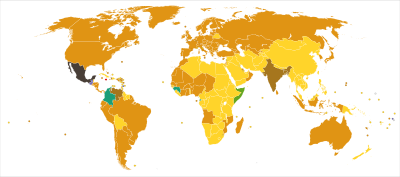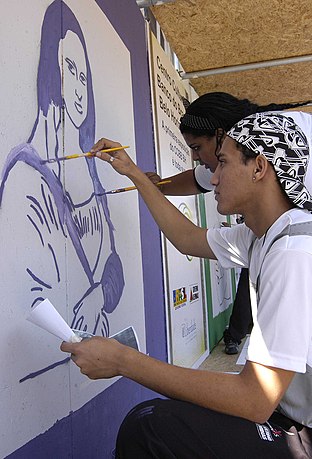Викисклад:Правила авторских прав
Files uploaded to Commons should be free both in the country of origin (as defined by the Berne Convention) and in the United States of America, and possibly in other countries involved, either through being properly licensed by the copyright owner or being in the public domain.
Copyright rules by subject matter
- Основная страница: Викисклад:Правила авторского права попредметно.
Викисклад:Правила авторского права попредметно brings together a variety of subjects and aims to answer the question "Can I upload photographs/pictures of ...?"
It is ![]() OK to upload:
OK to upload:
- Generally, photos you have taken yourself of uncopyrightable subjects such as views; nature; yourself; and people who have given their consent for you to photograph them and for you to publish the photograph. (However, you should remember that uploads should be educational - Commons is not your private web space.)
- Photos taken by you, or scans or photocopies made by you of objects or designs whose copyright has expired (usually 70 years after the death of the author, but see Commons:Нормы авторского права по странам for a country-by-country list).
- Mere mechanical scans or photocopies, made by somebody else, of an object or design old enough to be in the public domain (usually 70 years after the death of the author, but see Commons:Нормы авторского права по странам for a country-by-country list). For scans of old images that may have been enhanced, see Commons:When to use the PD-scan tag/ru.
- Photographs, taken either by yourself or someone else, that are faithful reproductions of 2D public domain works of art. See Commons:Когда использовать тег PD-Art.
Other subjects may or may not be allowable - see headings at Викисклад:Правила авторского права попредметно. If you want to have an answer to the question "Can I upload photographs/pictures from ...?", see the section at Викисклад:Правила авторского права попредметно on Internet images. See also: Commons:Порог оригинальности.
Проверочный список
Предположим, вы сделали снимок своим фотоаппаратом, отсканировали его откуда-нибудь, или загрузили его из интернета — и хотите загрузить его на Викисклад. Как узнать, можно это сделать или нет? Вот простая таблица, которая поможет вам это определить. Если сомнения останутся, прочтите ниже советы для своей страны. Если вы всё ещё не уверены, задайте вопрос на Commons:Help desk или Commons:Village pump (по-английски), или же на Commons:Village pump/ru (по-русски).
См. Викисклад:Правила авторского права попредметно с более подробным перечнем примеров.
 ОК
ОК
Собственные фотографии:
- Природы (леса, неба и т. д.)
- Животных (кошек, собак, муравьёв, жуков и т. д.)
- Insects (ants, beetles, etc.)
- Овощей и фруктов (яблок, помидоров и т. д.)
- Людей, давших своё разрешение на съёмку и публикацию этих изображений
- Самого себя (в разумных пределах, ведь здесь не хостинг для персональных фотоальбомов), но не фотографии вас, сделанные другими людьми (это требует согласия того, кто создал изображение)
- Объектов, находящихся в общественном достоянии одновременно в вашей стране и в США:
- Зданий, построенных по проекту архитектора, умершего более 70 (предпочтительнее даже, если более 100) лет назад
- Художественных произведений, автор которых умер более 70 (предпочтительнее даже, если более 100) лет назад, и впервые опубликованных до 1923 года
- Книг, автор которых умер более 70 (предпочтительнее даже, если более 100) лет назад, и впервые опубликованных до 1923 года
- Газетных и журнальных публикаций, автор которых умер более 70 (предпочтительнее даже, если более 100) лет назад, и впервые опубликованных до 1923 года
Отсканированные вами:
- Материалы, копирайт на которые истёк в вашей стране и в США.
- Изображения, созданные вами целиком (не основанные на какой-нибудь иной работе, или основанные на источнике, находящемся в общественном достоянии)
Материалы с веб-сайтов:
- Материалы, копирайт на которые истёк в вашей стране, в США и в стране нахождения сервера.
Под вопросом: могут быть, а могут и не быть ОК
Все виды материалов, защищённых авторским правом, если тот, кто их загружает, не является владельцем авторских прав:
- Фирменные знаки / логотипы (но только очень простые, см. Викисклад:Лицензирование #Тривиальный дизайн)
- Скриншоты (cм. Commons:Снимки экрана)
Photographs, drawings, scans and other reproductions of:
- Автомобили (cars with only one color and without any ads, paintings etc. are OK)
- Изделия ежедневного пользования (simple designs are OK)
- Обложки книг (но только очень простые)
- Денежные знаки (depends on country law; please see Commons:Денежные знаки)
- Здания, построенные архитектором, умершим менее 70 лет назад (или живущим поныне) (см. о Commons:Свобода панорамы)
- Художественные произведения, установленные в общественно-доступных местах, выполненные автором, умершим менее 70 лет назад (или живущим поныне) (см. о Commons:Свобода панорамы)
- Интерьеры частных домов, квартир, музеев
- Фотографии знаменитостей (see Commons:Фотографии идентифицируемых людей)
- Фотографии людей, не давших своего разрешения (see Commons:Фотографии идентифицируемых людей)
 Не ОК
Не ОК
- Изображения на условиях «добросовестного использования» (см. Commons:Добросовестное использование)
- Творчество фанатов, близко перекликающееся с защищенными материалами (see Commons:Fan art)
- Воспроизведение объектов, авторское право на которые принадлежит не вам, например:
- Action figures, statuettes and other copyrighted material. See Commons:Производные работы.
- Album, videogame, movie and other commercial products covers, posters, newspapers and magazines whose copyright has not expired (covers and interiors).
- Sounds of things that are copyrighted by someone other than you, like the following:
- Copyrighted radio stations (programs and commercials)
- Lyric songs created by an author whose copyright has not expired
Правила авторских прав по территориям
- Основная страница: Commons:Нормы авторского права по странам.

Laws about copyright differ from country to country. Images uploaded to Commons, unless uploaded from the United States, involve the interaction of two or more copyright jurisdictions. The laws of individual countries differ especially in the following points:
- The time for which a copyright applies. In most countries, copyright expires no later than 70 years after the death of the author (p.m.a.). There may be special terms for recently published old material.
- Status of works of the government. In many (but not all) countries, documents published by the government for official use are in the public domain.
- Material applicable for copyright. In some jurisdictions, pictures of artistic work like architecture, sculptures, clothing etc. can not be used freely without the consent of the creator of the original artwork.
Почти все страны мира придерживаются бернской конвенции (здесь можно посмотреть её текст). Согласно этой конвенции, авторские права из других государств должны соблюдаться, согласно определённым правилам. Как следствие, мы всегда должны руководствоваться законами страны, в которой была создана данная работа.
Как справиться с отсутствием информации
Когда дата неизвестна

Assume the most recent possible date considering the subject. The photo here shows Albert Einstein and his wife Elsa. Elsa died on December 20, 1936; Albert later on April 18, 1955. Therefore, it was taken before December 20, 1936.
Когда место неизвестно
Assume the most restrictive reasonably possible location considering the subject. In the Einstein photo here, it could be the United States, Germany, the Atlantic Ocean (assuming the Einstein couple was on board a ship) or any other country or location he reasonably could have gotten a photo taken in, but it would not likely be Nepal, for example.
Когда фотограф неизвест_на
Assume the most reasonable restrictive copyright barring evidence to the contrary. That is, unless the site or source itself asserts a freer set of rights (and you have good reason to believe they are not misapplying rights they do not have) assume the photographer retained all rights he legally could in his jurisdiction.
But the Berne Convention says that photographs are in the public domain 50 years after publication if the photographer is unknown. This applies unless a country has made a specific law.
Generally, for countries with copyright terms based on the death of the author, community consensus has found that it is safe to assume that the author died no more than 50 years after creating the work in cases where the author is unknown. This is encapsulated in the template {{PD-old-assumed}}.
Пример

Assume that the author of the image on the right is unknown to us, but not unknown in the copyright sense. We know that the image represents the ship Borda, which was scrapped in 1891. The image could have been taken that year by a 20-year-old man, who could die of old age in his 90s; this brings us to 1960. Assuming the normal terms for "works" apply and a 70-year long copyright term pma, the image would be covered by copyright until the 2030s. If the work was truly anonymous, then the copyright probably did not exceed 1891 + 70 = 1961, which means it is free if it was published before 1929 (or free in USA for other reasons).
Caution, not being able to find an author does not mean that the work is anonymous. It can mean that we did not search long enough or at the right place.
См. также: Commons:Рамки проекта/Превентивный принцип.
См. также
- Commons:Wikilivres – a similar site which is not operated by the Wikimedia Foundation but which allows for material in the Canadian public domain which is less restrictive than the United States
- Прочитайте Часто задаваемые вопросы и ответы на них.
- Если вы разместите
{{helpme}}на своей странице обсуждения, доброволец отзовётся в максимально короткие сроки! - Присоединяйтесь к IRC-каналу #wikimedia-commons для общения в реальном времени. Впервые в IRC? Нажмите здесь, чтобы мгновенно подключиться!
- Посетите Центр помощи Викисклада.


